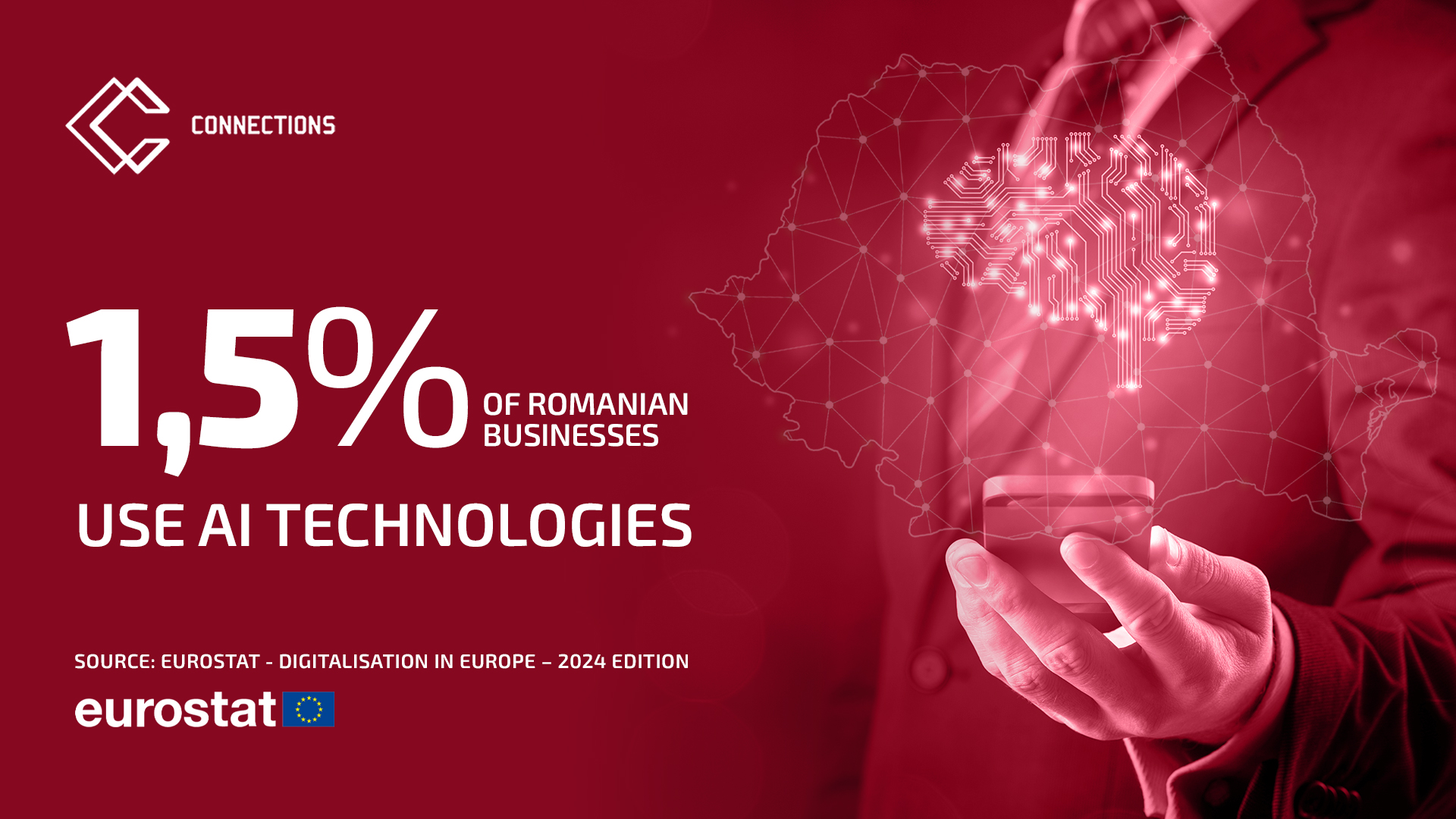
Artificial intelligence (AI) has become a transformative force in the global economy, with the potential to revolutionize a wide range of industries. However, its adoption in Romania still lags behind other European Union member states.
According to the “Digitalization in Europe – 2024 Edition” report published by EUROSTAT, only 8% of firms in the EU were using AI technologies.
Romania recorded the lowest adoption rate, with only 1.5% of companies using AI. Geographically, Denmark and Finland are leading (15%), followed by Luxembourg and Belgium (14%), while Romania ranks last (>2%) alongside Bulgaria, Poland, Hungary, and Greece (all 4%). Source: Eurostat – access to dataset
This gap is significant, considering that AI has the potential to increase productivity, improve operational efficiency, and create new business models. The low adoption of AI in Romania is likely due to a number of factors, including a lack of awareness of the benefits of this technology, limited access to resources and expertise, as well as an uncertain regulatory framework.
Recognizing the importance of AI for economic competitiveness, the European Union recently enacted the “Artificial Intelligence Act” (AI ACT). This law establishes a regulatory framework for the development and use of AI in the EU, aiming to promote innovation, protect fundamental rights, and ensure public safety.
Implementation trends of AI in several pioneering fields:
- Cybersecurity: AI is used to detect and prevent cyber-attacks. Algorithms can analyze data to identify suspicious patterns and take swift remedial action.
- Healthcare: AI is used for the analysis of medical images (X-rays, CT scans) to detect diseases such as cancer and to personalize treatments for patients, taking into account medical history and genetic factors.
- Finance: AI is used to detect financial fraud through the analysis of transactions.
- Manufacturing: AI optimizes production processes to increase efficiency and quality, performs automated quality inspections of products, and conducts predictive maintenance of equipment.
Current Trends in the AI Market
The global artificial intelligence market is experiencing rapid expansion. According to Forbes, the size of the AI market is projected to reach $407 billion by 2027. This rapid growth is driven by several factors, including:
- Increasing adoption of AI by companies: More and more companies are realizing the potential of this technology to improve operations, increase productivity, and create new business opportunities.
- Large investments in AI research and development: Governments and private companies are investing significantly in AI research and development, leading to the creation of new technologies and applications in this field.
- Increased availability of data: The amount of data generated globally is continuously growing. This data serves as fuel for AI, allowing algorithms to learn and improve.
The Forbes study shows that over half of business owners are already using AI for cybersecurity and fraud management, while 53% of companies are using AI to improve production processes, and 51% are using it for task automation.
The significant gap between Romania and other European Union member states regarding AI adoption reflects not only a lack of infrastructure and expertise but also a complex set of structural and cultural issues. While the EU is adopting legislation and investing in AI research and development, Romania faces challenges related to education, regulation, and digital infrastructure.
As our country aims to close the gap, it is essential to address these challenges in an integrated and strategically planned manner. Investments in education and professional training, creating a business environment conducive to innovation, developing digital infrastructure, and promoting collaboration between the public and private sectors are just a few of the key elements needed to stimulate AI adoption and harness its transformative potential.
The European Union is betting on the positive impact of artificial intelligence and will invest in AI research and development, providing companies with opportunities to obtain funding for innovative projects. It will also support professional training programs in the field, thereby encouraging them to develop the necessary resources to adopt artificial intelligence.
It’s a train that can make several stops in Romania if there are passengers willing to board.
